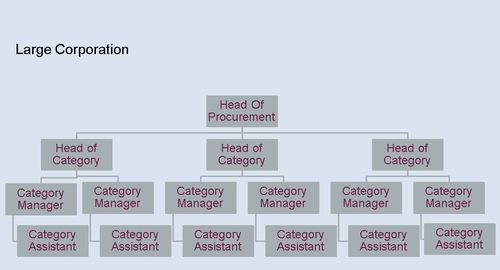Procurement Recruitment Demystified
Since beginning my career as a recruiter for procurement roles, I've learnt a huge amount about these jobs. What quickly became apparent is that there are a huge variety of roles. These roles have a different range of responsibilities, deliverables, challenges and rewards.
Another thing I’ve noticed when talking to friends is that very few people outside of procurement actually understand what it is. With that in mind, I thought I’d try to help people understand what procurement is in its simplest form, along with which types of roles we're able to help recruit.
So, what roles are there in procurement? Broadly speaking, procurement is split into direct and indirect. Direct procurement is the purchasing of goods and services that the organisation uses to sell on to its customers. Indirect procurement is the purchasing of goods and/or services that the business consumes on site to remain operational.

The main procurement roles we recruit for:
Head of Procurement: Generally the person with overall strategic responsibility for the procurement function within a company. This is ultimately defining exactly how the organisation goes about purchasing all of the products and services they use operationally. The remit for these roles can be local, national or global, depending on the size of the organisation. The responsibilities of this role in smaller companies include defining procurement strategy and organising processes and people to deliver against this strategy. Often, people in this role manage strategic stakeholder and supplier relationships. Additionally, depending on the size of the organisation the Head of Procurement will have a people leadership component to their role too. These people could be procurement managers, buyers, category managers or assistants.
Procurement Manager: In smaller companies, a procurement manager’s role can look extremely similar to that of a head of procurement. Larger companies often employ a number of procurement managers who report to the head of procurement. In this instance the procurement manager may then be responsible for key stakeholder and supplier relationships, perhaps even a category, or specifically direct or indirect purchasing. They may also have delegated responsibility for managing staff.
Category Manager: Again, dependant on company size, this role could differ slightly. However, category managers tend to be responsible for management of stakeholders and suppliers across a particular range of products and/or for a particular project within a company. This is often called “strategic sourcing”. Their role will include managing relationships and negotiating prices and/or contracts. Their remit could also include the actual purchasing of these items from the suppliers too. Often this will be delegated to buyers who place the orders.
Senior Buyers: This is another role within some companies that can hold greater responsibility depending on company size. This role could include components of a procurement manager’s job description. However often, the remit of this role will be similar to that of a category manager. The key difference is often that a senior buyer tends to be responsible for a wider variety of stakeholders and suppliers, rather than being assigned to a particular category.
Buyers/Assistant Buyers/Category Assistant: Finally (again, this can differ greatly by company size) there tend to be buyers and assistant buyers. They are responsible for the "on the ground" purchasing of the products. They will be responsible for maintaining stock levels and keeping on top of orders so the production/sales/opetations processes run smoothly. They may also need to negotiate and/or lease with suppliers and sourcing new ones where required.

The names of these roles, along with the responsibilities, often differ by company. You may see a head of procurement role named head of purchasing. A procurement manager could be a purchasing manager. Consequently, procurement can be a confusing space to understand.

At Macildowie, we want to help you see through this mist when recruiting your next procurement professional. Ultimately we want to understand what skills, experience, behaviours and motivations your ideal candidate needs to have. We can help to navigate the candidate market and understand what challenges and rewards you might face in the current procurement candidate market.